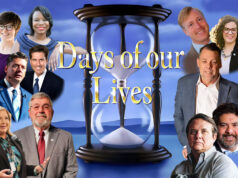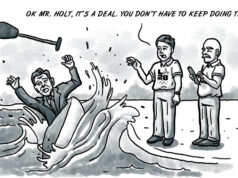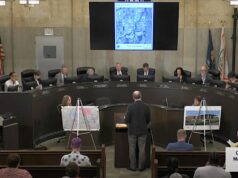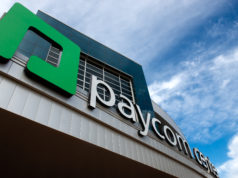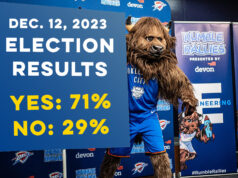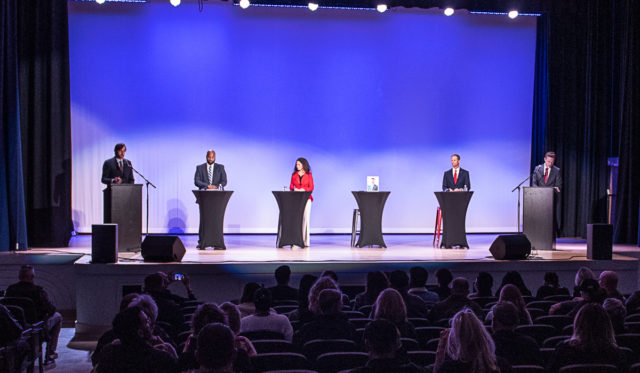

Three of the four candidates for Oklahoma City mayor took to the debate stage at The Auditorium at The Douglass tonight covering a variety of topics ranging from potholes to policing and municipal services to MAPS 4. Co-hosted by NonDoc, News 9 and other organizations, the debate at times touched on meat and potatoes policy, and at times veered toward the bizarre.
Incumbent Mayor David Holt declined to attend. He was represented on stage by a framed picture sitting on a table next to the other candidates. Holt is ahead of the others in the polling released by his campaign, but challengers Carol Hefner, Frank Urbanic and Jimmy Lawson wasted no time in castigating Holt for not showing up to take part.
“I want to say about, Mr. No Show Holt, Mr. Mayor McSelfie, he shows at all sorts of places and takes the picture and leaves,” said Hefner, a developer. “I get those reports regularly when I visit all eight wards. I’ve been to all eight wards. Our family has business across these wards for many years. When I go into these wards, I ask if they’ve seen Mayor Holt lately, and five of them say they haven’t seen him.”
Urbanic, a criminal defense attorney, was also critical of Holt’s absence.
“It’s an absolute disgrace,” Urbanic said. “He should be ashamed of himself because this is a slap to every voter in Oklahoma City. What schemes does he have that he doesn’t want us to hear about? Clearly he’s made a political calculation he’s harmed less by staying at home rather than coming here.”
Lawson, who works as the director of permitting for the Oklahoma Workers Compensation Commission and as a professor at Rose State College, is a life-long friend of Julius Jones, whose efforts to avoid the death penalty captured widespread attention last year.
“I think his absence speaks volumes about where we are as a city,” Lawson said. “This is not the first time Mayor Holt has not shown up. I think I have a personal experience about his inability to be communicative. When we were going through the situation with my friend Julius Jones, whether you are for or against a particular case, if you are a mayor of a city that has a national case in your lap, I think it’s your responsibility to at least make a statement.”
Lawson: Goal should be to eliminate homelessness
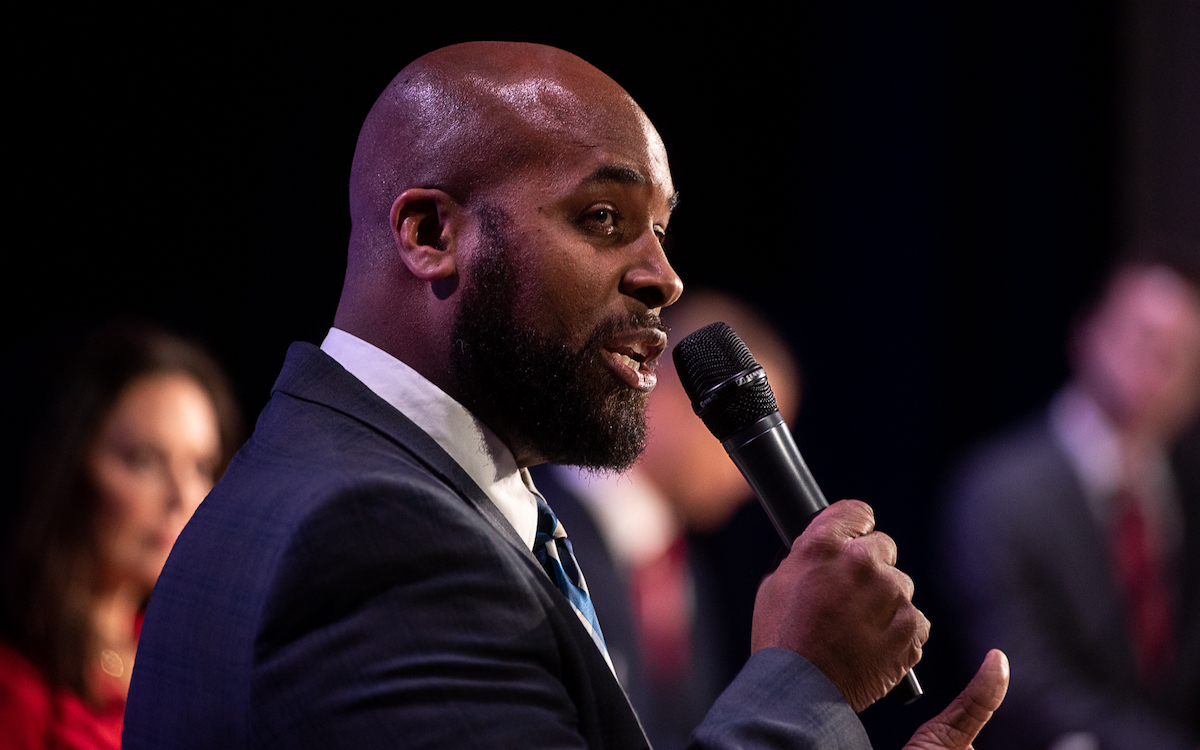
Oklahoma City voters will head to the polls Tuesday, Feb. 8, to vote in the mayoral election. If no candidate receives more than 50 percent of the vote, the top two finishers would head to an April 5 runoff election.
Tuesday night, candidates were asked what issue they consider to be flying under the radar in Oklahoma City.
“I think one the components for me is our growing homelessness rate,” Lawson said. “I think our city has done an ineffective job in putting programs and resources in place to address that issue. Now, there are some programs that do address that, but however, my vision for Oklahoma City to eliminate homelessness.”
If elected, Lawson said he would build transitional housing complexes for homeless people that also address mental health issues.
Hefner, who has claimed on social media that homeless people are being sent from California to Oklahoma City, doubled down on that theory in one of the more unusual moments of the debate.
“There are two issues,” Hefner began. “Crime and homelessness. Those two often go hand-in-hand. I have spoken to 92 homeless people, and I found out 89 of them are from the west coast. They were given a one-way bus ticket, and they said they didn’t know where they were going. One woman told me she just wanted to go home. Building them a complex keeps them here and brings more here because word gets out.”
Urbanic, who has waged legal fights against coronavirus mitigation efforts like mask ordinances and the closing of some public spaces, said it’s time to open things up again.
“My issue is so under the radar that neither brought it up,” he said. “Let’s talk about government buildings that are still closed. The police department lobby is closed. The administration building is closed. City Hall is closed. They say two of the three are closed for renovation, but you look inside and there’s no renovation going on. We need to get back to getting business done.”
Hefner addresses social media presence
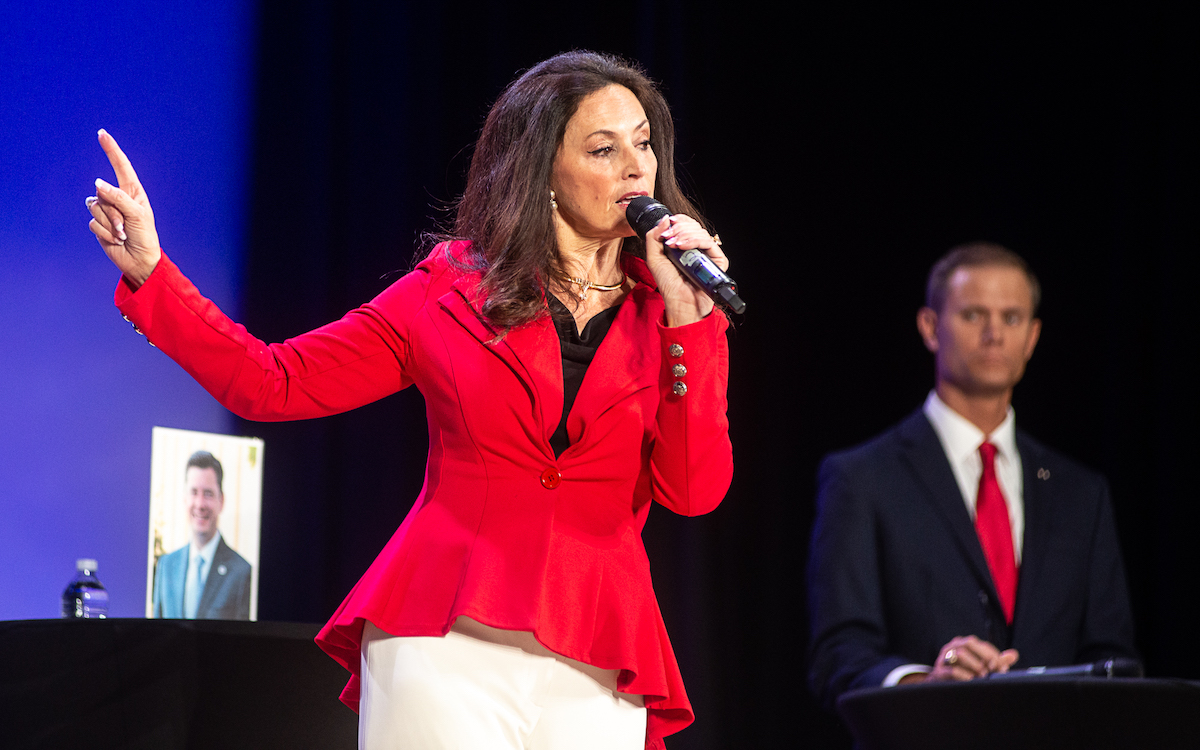
In past social media posts, Hefner has compared former President Barack Obama to Adolf Hitler and has said Islam is an “evil culture,” not a religion. Asked whether OKC residents should worry that she would be a divisive and negative city leader, Hefner attempted to walk back those past comments before also saying the religion should be “eradicated.”
“I think we all learn, and we all give each other grace,” Hefner said. “I think some of those comments, while I might revisit them, and sit down and have meaningful conversations with people across the city about those, those were done a long time ago.”
Hefner claimed her family, which is Lebanese, had been victims of the religion.
“In escaping Islam and the oppression, my grandfathers had crosses tattooed in the middle of their hands,” Hefner said. “One was from Nazareth. One was from near the Sea of Galilee. And they were identified, just like Holocaust victims who have tattoos on their arms.”
Hefner did not back down from her past comments on Islam, painting a picture of an Oklahoma City where those that practice it might not be welcome if she is elected mayor.
“Yes, it is a very negative culture, and it does things that are oppressive,” she said. “And I don’t agree with that. It’s just like slavery. It’s insipid. It should be eradicated from our culture, from our world. Unfortunately it’s been here since the beginning of time. I don’t know how personally I’m going to get rid of it, but I’d like to have those conversations.”
Everyone hates potholes
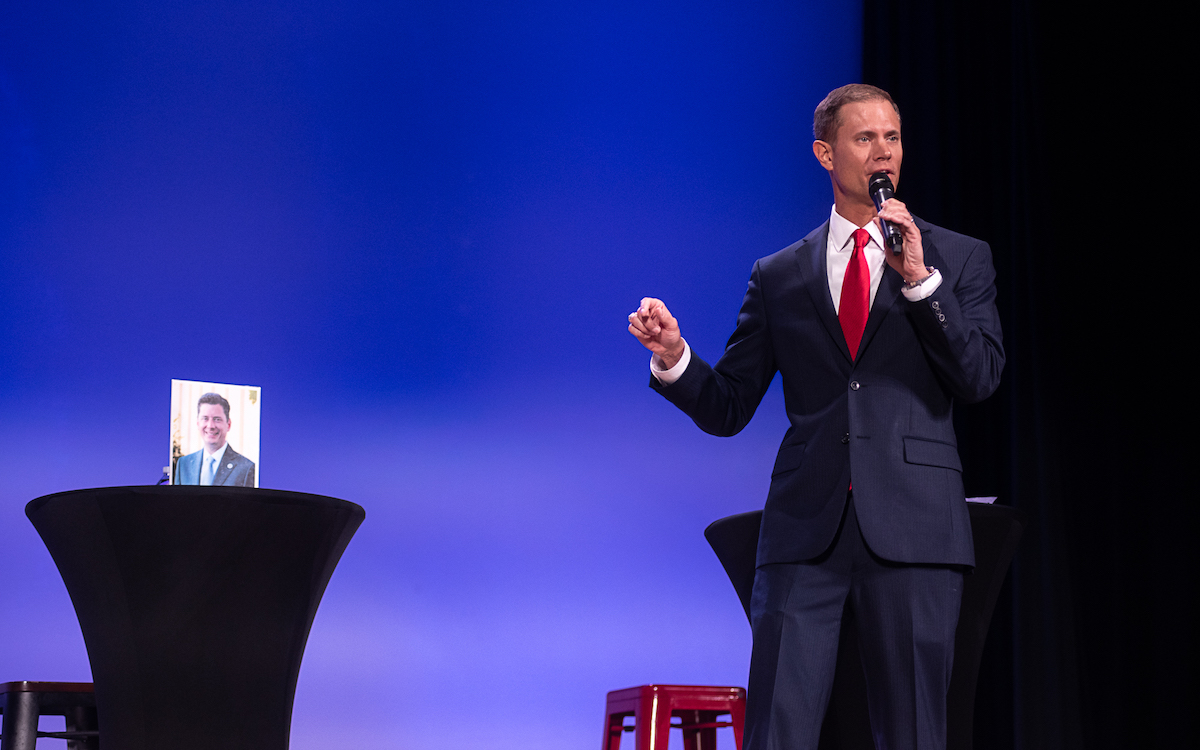
Oklahoma City’s roads continue to earn poor grades from residents, who view the topic as among the city’s top concerns. All of the candidates said the process of repairing roads and how traffic flows could be improved.
“The real problem would be the potholes,” Urbanic said. “I talk to people, especially those in Canadian and Cleveland counties, and they feel like they need an alignment for their car when they go to and from work. You all need to go and see the part of 5th Street as you’re going east onto I-235. It’s filled with a bunch of patches and pot holes. If this is the area that our mayor and City Council are supposedly focusing on and they’re this bad, imagine what the roads are like outside of those areas. It’s not just about fixing roads to say, ‘Hey we fixed it,’ we need to actually do a quality fix.”
Lawson said he has experienced the cruel world of potholed roads.
“I would have to second Mr. Urbanic. I’ve been the victim of potholes,” Lawson said, drawing laughter from the crowd. “My truck lost an axel. Potholes for me would be number one. I think the city has a lot of work to do with potholes. I think you all would concur with that. I would want to take a survey of what all those streets with potholes look like and then get them fixed.”
Hefner said Holt has done little to fix roads in the city as mayor before touting her own expertise.
“No Show Holt hasn’t done anything about it and seems not to care,” she said. “He doesn’t go to many wards, so he doesn’t know what those roads look like. I know what it takes to build a quality road.”
Two candidates take aim at MAPS 4
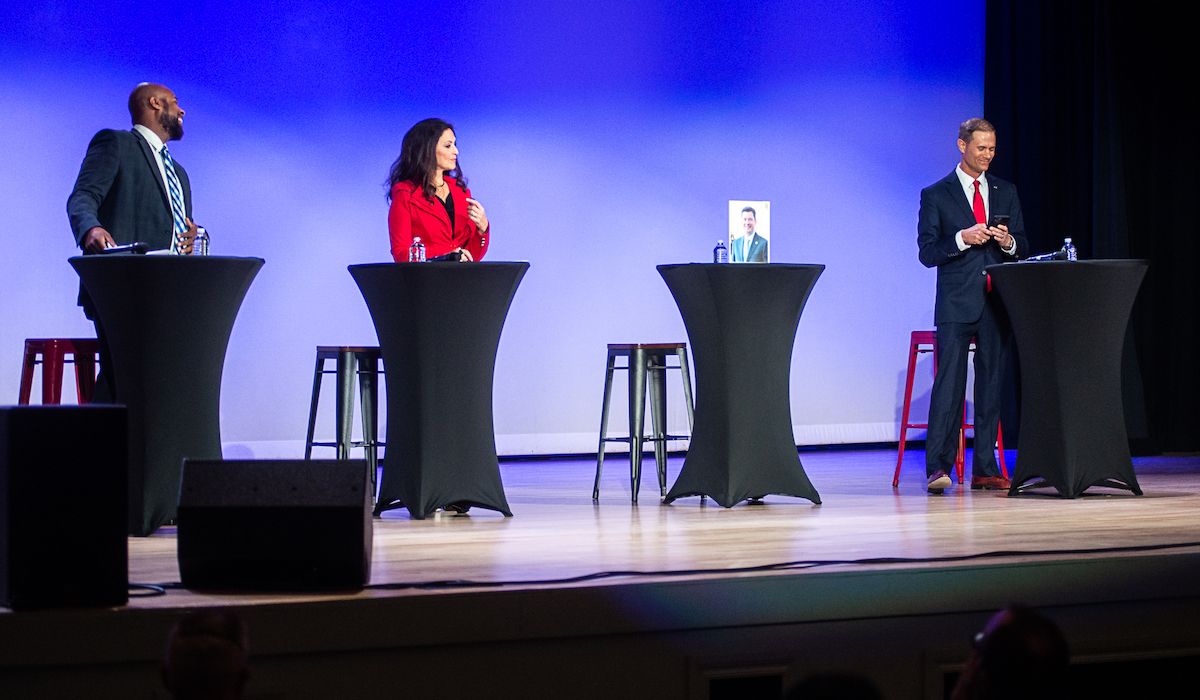
Both Urbanic and Hefner have been highly critical of MAPS 4 in TV appearances and on their campaign websites. Both said the programs amounted to pork projects. MAPS 4 passed in December 2019 with 70 percent of the vote. However, turnout was low with only 10 percent of eligible voters casting a ballot.
Hefner touted her past anti-MAPS chops.
“I was the only one who fought against MAPS 4 publicly,” she said. “I went on morning shows. I challenged No Show Holt to a debate. Only 14,000 people showed up, and it was called a landslide election. They put these other items in there so they could have support. We need to do an audit of the MAPS programs. Many of them are social programs. The purpose of government is to protect life, liberty and property. That needs to be our focus, and we should stay in that lane.”
Urbanic said the MAPS 4 programs are aimed at a narrow group of people.
“They aren’t really that popular,” Urbanic said of MAPS projects. “They took a bunch of things with narrow appeal, and once you got that narrow constituency groups to vote for it, it passed. We are under no obligation to continue to build those projects. That’s why I keep talking about defunding the street car. That subsidy comes from the general fund, and that money could be re-allocated elsewhere.”
Lawson said his experiences with youth centers as a teen were helpful to his development. He said the teen centers were the best part of MAPS 4.
“I think one of the amazing benefits is the location of the youth centers,” Lawson said. “Education changed my life. I have an idea of how these youth centers should look. We know that every kid is not going to college but they still need guidance and training. So I think the youth centers are an amazing way to get all of that under one umbrella.”
Follow @NonDocMedia on:
EMSA response times draw criticism
EMSA’s lagging response times have become an issue when it comes to the public trust authority’s relationship with the city. All of the candidates agreed that response times need to improve if the city is going to continue to maintain that relationship, though some were opposed to what is considered the most likely alternative.
“Simply put you’ve got to perform,” Lawson said. “If EMSA can’t perform, we have to find another company that can perform. I was a victim of my father having a heart attack, and response times are important to me. If EMSA is not responding in a good fashion. Lives are being lost. If EMSA is not getting the job done, we will find another contract company to come in and provide those services.”
Hefner said she has seen EMSA as a problem since its beginning in 1977.
“I have had lots of experiences with EMSA,” she said. “EMSA has been broken since I can remember. I’m 60 years old. For at least the last 40 years, I’ve encountered it with my husband, my grandparents and with a child that died in my arms.”
Hefner suggested EMSA move to a system which stations ambulances throughout the city, though EMSA already has multiple stations around the city.
“There is a way forward,” she said. “It’s called a grid system. It would give us the ability to send these units out within reasonable time.”
Urbanic said staffing is the primary issue with response times.
“We need to figure out how we can get more people working for EMSA, and how we can arrange things in a more efficient way,” Urbanic said. “And of course, what is the pay like in comparison to other communities. EMSA deals with things in our city that no other organization has to deal with, and they need to be paid accordingly.”
Urbanic, Hefner and Lawson all said they were opposed to the city’s fire department taking over ambulance services in Oklahoma City.
Candidates draw contrasts on policing
Hefner said she values the city’s police force more than Holt, who has earned the endorsement of the Fraternal Order of Police last year.
“Let me tell you something, once I brought this up and I brought up the pressure that the police are under in Oklahoma City, Mayor Holt shows up and says he’s going to give them a pittance of a raise and some guns,” she said. “He doesn’t understand the importance of life, liberty and property and the importance of it in our constitution.”
Lawson said he does not believe Holt understands how policing works in some areas of the city.
“I think the biggest difference is the relationship David Holt has with certain communities,” he said. “I don’t think he understands the dynamic in certain communities and the police. I don’t think he’s dived in deep enough on how it works across the city. We have to understand our population is made up of many ethnicities. How are citizens being treated in all communities? As mayor, I will have those tough conversations.”
Urbanic said his experience as a criminal defense attorney gives him a unique perspective on policing issues.
“I’ve done a lot of work as a criminal defense attorney, and that’s not something I’m ashamed of,” he said. “I’m proud of it. I’ve represented hundreds of people and watched thousands of hours of police body cam footage, much of it from the Oklahoma City Police Department. I’ve seen nothing but professionalism. I’ve seen them go out of the way for people when they didn’t have to. This is a position of knowledge nobody else has.”
‘I have a proven track record of fighting for people’
All three candidates were asked to identify what most qualifies them to be mayor and what is their best personality trait. Lawson said his ability to relate to people was his biggest asset.
“My commonality and my relatability,” he said. “I’m a father, and I am a husband of 19 years. I think my servanthood with my mentoring programs with Oklahoma City Public Schools allows me to connect with the common person.”
Urbanic cited his past efforts at fighting against coronavirus mitigation efforts as an example of his best trait.
“I have a proven track record of success fighting for a lot of people,” he said. “When these businesses were shut down, I was on the front lines to open them up. In fact, one of the people running was actively fighting me to keep businesses open. I think it’s very clear that I will be working for the people of Oklahoma City at great sacrifice to myself.”
Hefner said her love of working with people was perhaps her best trait and qualification to be mayor.
“I think my best trait is people,” she said. “I love hanging out with people and making connections. It’s worth it. We’re all Oklahoma Cityans and we’re all in this together.”
Tuesday’s debate was produced in partnership between NonDoc, News 9, Oklahoma City Free Press, the City Sentinel, the Oklahoma Gazette, Generation Citizen, Together Oklahoma and the League of Women Voters of Oklahoma County.
Watch the OKC mayoral debate
The full OKC mayoral debate can be viewed on News9.com or in the Facebook video embedded below.









